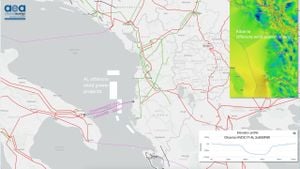Legal issues surrounding financial technology and land use are making headlines in Indonesia, highlighting both consumer grievances and agricultural management failures. Recent allegations against the fintech company Amartha have surfaced, focusing on its lack of office presence and communication failures.
On February 19, 2025, Sri Endang Sari, one of the customers of Amartha, expressed her frustrations with the company’s operations, claiming she felt cheated alongside fellow group members. She reported inconsistencies with her loan payments, stating, "Saya ada bukti simpanan pokok Rp100.000 ada di buku rekening BRI, bahkan di Kartu Angsuran Majelis jelas juga ada uang pokok Rp100.000, kenapa di sistem Amartha tidak ada?" (I have proof of the principal deposit of 100,000 IDR recorded at BRI, and it is clearly noted on the Membership Payment Card, why isn’t it on the Amartha system?).
Customers like Sari are not just dealing with mere administrative errors; they are faced with issues accessing proper assistance from Amartha. Two of the reported customer service numbers are said to be inactive, leaving users bewildered about where to turn for help. Sari and others have noticed irregularities where their payments appear to be miscounted, with many questioning why their "Kartu Angsuran Majelis" (Membership Payment Card) was never handed directly to them but instead collected at the group leader's home.
The situation escalated when Eli, manager of the Amartha branch at Pulau Rakyat, responded to these complaints. He acknowledged the existence of issues, admitting, "Ada masuk ke sistem tapi satu, yang satu lagi tagihan langsung petugas kutip tidak ada masuk ke sistem" (One amount was entered in the system, but the other was collected directly by the officer). Eli elaborated on the situation, indicating mismanagement due to the resignation of previous employees, which complicates the matter for current staff and customers alike.
While customers navigate through these fintech troubles, the Kanwil Badan Pertanahan Nasional (BPN) Sumut is facing its challenges with alleged mismanagement of land-use permits. The BPN has reported 221 inactive land-use permits (HGU) covering approximately 190 thousand hectares across North Sumatra. During a meeting of DPRD Sumut on February 25, 2025, Zeira Salim Ritonga expressed the urgent need for action. "Menteri ATR/BPN melalui Satgas Sawit telah melakukan penertiban 1,1 juta hektare lahan sawit yang bermasalah. Seharusnya kebijakan itu diikuti Kanwil BPN Sumut dengan sesegera mungkin menyita atau mengambil-alih untuk negara 221 HGU perkebunan yang tidak aktif di Sumut," he urged (The Minister of ATR/BPN, through the Palm Oil Task Force, has conducted regulation on 1.1 million hectares of problematic oil palm land. This policy should be followed by Kanwil BPN Sumut to immediately seize or take over the 221 inactive plantation HGUs for the state).
This abundant supply of inactive land could potentially be repurposed for more productive uses, including food production or renewable energy development, which can improve national food and energy independence. Ritonga noted, "Kalau disita, lahan-lahan ini nantinya bisa saja dapat dialihkan untuk penggunaan lain yang lebih produktif" (If seized, these lands could be repurposed for more productive uses).
With BPN's growing emphasis on addressing the inefficiency of these inactive HGUs, concerns about lost opportunities from the agricultural sector loom large. Sorta Siahaan, chair of Komisi B DPRD Sumut, lamented, "Ternyata dari sektor perkebunan, banyak peluang yang terbuang" (It turns out, many opportunities are wasted from the plantation sector). Such comments reflect the broader concern of economic loss due to ineffective land management practices, particularly at this pivotal moment of economic recovery and development.
The cases surrounding both Amartha and the BPN signify the growing need for transparent operations and accountability, as these issues resonate deeply with both consumers and the agricultural community. The hope is for swift resolution, ensuring proper management of fintech operations and land resources alike to benefit the economy and those who rely on these services.



